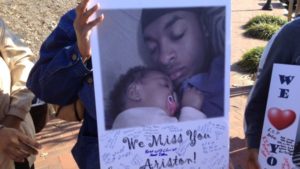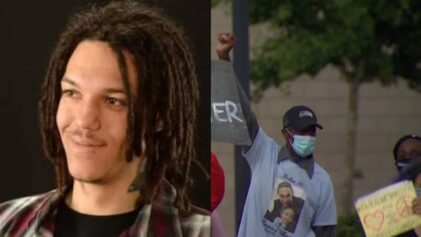Back in 2011, Union City police officer Luther Lewis fatally shot 19-year-old Ariston Waiters.
It was a case that closely mirrored many of the other fatal shootings of Black men across the country.
Lewis insisted that the teen posed a threat to the community when he took off running from police.
Waiters was at a party when a fight broke out that resulted in police being called to the scene. Several shots were fired into the air by the feuding teens.
It isn’t clear if Waiters was involved in the shooting.
Regardless of what happened during the chaos, Lewis chased Waiters before successfully pinning him to the ground, WSB-TV reports.
While he was on the ground, two bullets pierced through his back and forever etched his name on a growing list of victims reminding the nation why communities across the country are chanting, “Black lives matter.”
He was also added to a list of victims who would never receive justice. His family became yet another that would never see their loved one’s killer even be faced with charges related to the teen’s death.
Much like the killers of 18-year-old Michael Brown, Staten Island father Eric Garner and countless other unarmed Black citizens, Lewis was never indicted by a grand jury.
But now there will be a second chance for the Waiters family to get what they have been wanting for roughly three years.
While the loss of their loved one will be something nobody can ever resolve, they now have a second chance of seeing the officer charged for the teenager’s death.
An investigation by Chanel 2 Action News and the Atlanta Journal-Constitution uncovered key witnesses that were never questioned, conflicting reports from the officer himself and a variety of other findings that Fulton County District Attorney Paul Howard believes would have been essential to this case.
“Even if the deceased in this case had physically defended himself … he had a right to do it because he was being illegally arrested,” Howard said, according to a report by WSB-TV.
The grand jury, however, failed to indict the officer of any of the recommended charges of felony murder, aggravated assault, false imprisonment and violation of oath.
The new evidence includes a never-before-seen video of Lewis re-enacting how he says Waiters allegedly reached for a weapon.
“My mind is telling me he’s fixing to pull a gun out and I’m like frickin’ flipping out,” Lewis says in the video.
He then demonstrates how he suggests that Waiters, while face down on the ground, managed to reach so far back and up that he nearly snatched the officer’s weapon.
The problem, however, is that his account on video doesn’t match up with the story he gave in an earlier statement.
Experts said the statements were clearly “self-contradictory” and failed to even match with forensic evidence findings that many suggested should have been enough to secure a trial at the very least.
Even more troubling is the account provided by Union City police officer Chris McElroy who was a lieutenant at the time of the fatal shooting.
Being the first supervisor to arrive on the scene, McElroy expected to be in the courtroom giving his account to a grand jury.
Instead, he was barely questioned by investigators.
“It’s not sat right with me from the first time I arrived on the scene,” he told reporters. “There’s a lot of things that need to be answered. I think Mr. Waiters died senselessly, and his family deserves closure.”
He added that when Lewis first described the shooting to him, he made no mention of a struggle over his weapon because he insisted he had successfully pinned the subject down on the ground.
According to McElroy, Lewis stated that the suspect’s hands were underneath his body and the officer didn’t know if he had a weapon or not. In fear, McElroy suggested, Lewis fired.
“He was unable to pull his hands out from underneath him,” he told investigators. “He didn’t know what was under there, so he shot him twice.”
It’s a strong statement coming from a fellow officer, but one a grand jury never heard.
The grand jury was also never made aware of the accusations that several other command officers instructed McElroy to keep quiet about the incident and urged him not to file a report or write a statement.
McElroy said they even casually joked and bragged about keeping one of their own out of jail.
He had a testimony that would have been essential to this case, but he says the GBI never interviewed him.
“I was surprised I didn’t get called by the GBI, to be honest with you,” McElroy added. “I was the supervisor on duty, I was the first arriving supervisor on the scene. You would think that someone investigating it would want to talk to me.”
As the probe is reopened, it’s safe to say that investigators aren’t skipping out on having some insightful conversations with McElroy this time around.
Howard says the omission of such key testimony and conflicting reports should have been made clear to the grand jury and brought to his attention.
“We would have loved to have presented that to a grand jury,” Howard said. “If it was there and somebody didn’t bring that to my attention, I deem that as a mistake.”
As the investigation is reopened and new evidence is analyzed by investigators, the slain teen’s mother has been actively preparing to rally people together in honor of her son.
According to the Washington Times, she will be attending a City Council meeting Tuesday night to ask community members to help her in her continued fight to seek justice for her son.
![Dec. 16, 2011- Union City : The mother of Ariston Waiters, Freda Waiters (left) fights back tears holding a poster of her son as lawyer, Mawuli Mel Davis (center) and Ariston's godmother, Monique VanDross wipes away a tear Friday, Dec 16, 2011 in front of Union City's City Hall. Former Atlanta City Council member Derrick Boazman along with lawyer Mawuli Mel Davis and Georgia Senator, Vincent Fort, with family members of a suspect that was fatally wounded during an officer-involved shooting in Union City on Wednesday night came to City Hal in Union City wanting to meet with the Mayor. The 19-year-old man, identified by family members as Ariston Waiters, was killed following an apparent chase. The GBI is investigating at the request of the Union City Police Department, GBI spokesman John Bankhead told the AJC. Police responded to a call of a fight in progress on Hickory Lane before 7 p.m. and encountered a crowd of people, Channel 2 said. Some of the people ran, and an officer chased one of the suspects. Waiters was shot during a fight with the officer, the report said. But witnesses gave a different story. Xavier Tynes told Channel 2 there was no fight between Waiters and an officer. "He ran because he has a warrant" [for his arrest], Tynes said. Waiters was transported to Grady Memorial Hospital where he died, Channel 2 said. John Spink, jspink@ajc.com](https://atlantablackstar.com/wp-content/uploads/2015/05/slideshow_1002300468_121611-waiters_1-300x208.jpg)



